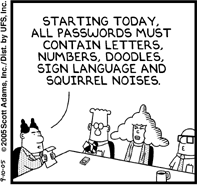HardOCP News
[H] News
- Joined
- Dec 31, 1969
- Messages
- 0
Obviously you guys know how to create a strong password but we all know people that don't (I'm looking at you mom), so pass this link along to those that need it. 
Following the hack of Zappos.com and 6pm.com there are probably quite a few of you looking for a way to create strong passwords and also remember them. You can create strong passwords that don't make you memorize a cryptic string of letters, numbers, and punctuation symbols. Here are three techniques.
![[H]ard|Forum](/styles/hardforum/xenforo/logo_dark.png)

